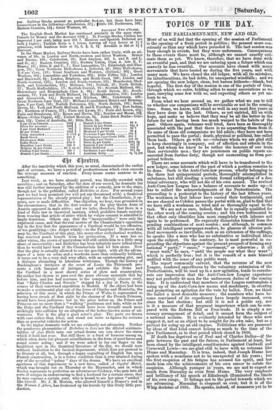it*trui:
After the inactivity which this year, as usual, characterized the earlier part of autumn, we have a period of productiveness which even exceeds the average measure of reaction. Every house seems anxious to do something.
Last week, as we have already proved, was literally crowded with novelties ; and on Saturday, after the date of our record, its dramatic list was still further increased by the addition of a comedy, new to the stage, though not to the publisher, called Richelieu in Love. For several years past we had been promised (we will not say threatened with) a theatrical representation of the already printed play ; but the Chamberlain, it ap- pears, saw or made difficulties. One objection, we hear, was grounded on the circumstance, that in the first version of the play Queen Anne of Austria appeared in male attire ; and we infer, therefore, that there is a kind of Salle law in theatrical matters, which prohibits female majesty from wearing that article of attire which by vulgar consent is admitted to imply dominion. Others say, that the " inexpressibles" were only the expressed cause, and that the real motive of the Chamberlain's opposition lay in the fear that the appearance of a Cardinal would be too offensive, or too gratifying—(we forget which)—to the Puseyites ! However that may be, the Cardinal of this play, like many other ecclesiastical worthies, has received much benefit from lay persecution. If a man has no other virtue, the crown of martyrdom will still entitle him to a little snug share of immortality ; and Richelieu has been infinitely more talked about than he would have been if the Chamberlain had let him alone. Now that the play is actually allowed to see the gas-light, with all the advan- tages of a miss en scene and a wardrobe more than ordinarily brilliant, it turns out to be a very dull wiry affair, with an uninteresting plot, and
i
a dialogue abounding in laborious witticisms. Though the history of Buckingham's intrigues at the court of Louis the Thirteenth pre- sents a rich banquet of intrigue, and exhibits the Duke and the Cardinal in a most showy series of plots and counterplots, the author has chosen to pass over the more obvious materials that lay before him, and has had recourse to the comparatively obscure story, that " Baby Charles and Steeple " stopped for a day at Paris, in the course of their renowned expedition to Madrid. If the object had been to make a sentimental.play out of the loves of Charles and Henrietta, the selection of this story, in which the Prince of Wales is represented as having been struck at first sight by the charms of the French Princess, would have been judicious ; but in the piece before us, the Prince and Princess are no more than a " walking" gentleman and lady, while as for the Duke and the Cardinal they would have been brought much more strikingly into collision by an adoption of the better-known series of ad- ventures. Nor is the play a good actor's play. The parts are drawn with care rather than force, and stand out more as figures for costume than as powerful vehicles for action. In the higher dramatic walk we are evidently not advancing. Neither the ponderous pleasantries of .Richelieu in Love nor the diluted sentimen- talities of Ann Blake raise our actual drama one iota above the status which it held last year. But still there is a fund of humour among us, which often darts out pleasant scintillations in the form of good farces and sound comic acting ; and if we were asked to lay our finger on the healthiest spot in the theatrical literature of the day, we should tam without hesitation to the farcical department, which does not pretend to be literary at all, but, through a happy engrafting of English fun upon French construction, is in a better condition than it ever attained during any of the so-called "palmy" days of the drama. We have an excellent specimen of this department in a new farce' called A Capital Match, which was brought out on Thursday at the Haymarket, and in which Keeley represents to perfection an adventurous Cockney, who gets into all sorts of scrapes in endeavouring to find a husband for a certain niece, that he may espouse a certain aunt, who is bound to see her niece "settled" like herself. Mr. J. M. Morton, who allowed himself a Homer's nod in --the Woman I Adore, has freshened up his laurels by this lively little pro- duction.


























 Previous page
Previous page